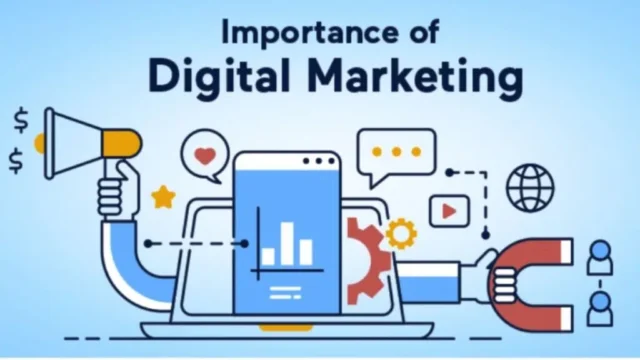In today’s digital landscape, the relationship between businesses and their customers has evolved dramatically. With the rise of social media, online reviews, and e-commerce, customer service has become an integral part of digital marketing strategies. It plays a vital role in shaping brand reputation, customer loyalty, and overall business success. This blog explores the importance of customer service in digital marketing and how it can significantly impact your brand’s performance.

Table of Contents
Toggle1. Building Trust and Credibility
Customer service is often the first point of contact between a brand and its customers. Providing exceptional service fosters trust and credibility, which are crucial in the digital age.
Why Trust Matters:
- Positive Brand Image: Companies that prioritize customer service are viewed more favorably. When customers feel valued, they are more likely to share their positive experiences with others, enhancing your brand’s reputation.
- Reducing Uncertainty: In online transactions, customers may hesitate to purchase from unfamiliar brands. Excellent customer service can alleviate concerns, encouraging them to complete their purchases.
2. Enhancing Customer Experience
In digital marketing, customer experience is paramount. A seamless, positive experience can lead to higher satisfaction and loyalty.
Key Elements of Customer Experience:
- Timely Responses: Quick responses to inquiries or complaints show customers that you value their time. Implementing chatbots or live chat options can help address customer needs in real time.
- Personalization: Tailoring customer interactions based on preferences and past behaviors can create a more engaging experience. Use data analytics to understand customer needs better and personalize your communications.
3. Encouraging Customer Loyalty
Loyal customers are more valuable than ever. They not only make repeat purchases but also become brand advocates, promoting your business through word-of-mouth.
Strategies to Foster Loyalty:
- Consistent Communication: Regularly engage with your customers through newsletters, social media, or personalized messages. Keeping in touch helps maintain relationships and encourages repeat business.
- Loyalty Programs: Implement loyalty programs that reward customers for their continued patronage. This can incentivize them to return and share their positive experiences with others.
4. Managing Online Reputation
In the digital age, a single negative review can significantly impact your brand’s reputation. Effective customer service helps manage and mitigate these challenges.
Reputation Management Techniques:
- Monitor Reviews: Keep track of customer reviews on platforms like Google, Yelp, and social media. Responding promptly to feedback—both positive and negative—demonstrates that you value customer opinions and are committed to improvement.
- Address Complaints Publicly: When customers voice complaints publicly, addressing them transparently can showcase your commitment to customer satisfaction. This not only resolves the issue for the individual but also reassures potential customers about your brand’s reliability.
5. Leveraging Social Media for Customer Engagement
Social media has transformed how businesses interact with customers. It provides a platform for direct engagement, allowing brands to respond to inquiries and feedback quickly.
Benefits of Social Media Engagement:
- Real-Time Interaction: Social media enables businesses to engage with customers in real time, addressing concerns and answering questions promptly. This immediacy can enhance customer satisfaction.
- Community Building: Creating a community around your brand fosters loyalty. Encourage customers to share their experiences and engage with one another, creating a sense of belonging.
6. Driving Sales and Revenue
Exceptional customer service can lead to increased sales and revenue. Happy customers are more likely to make repeat purchases and refer others to your business.
Impact on Sales:
- Upselling and Cross-Selling: A knowledgeable customer service team can identify opportunities for upselling or cross-selling during interactions, increasing average order values.
- Conversion Rates: Providing a positive customer experience can significantly improve conversion rates. When customers feel supported, they are more likely to complete their purchases.
7. Gaining Valuable Insights
Customer service interactions provide valuable insights into customer preferences, behaviors, and pain points. Analyzing this data can inform your digital marketing strategy.
How to Leverage Insights:
- Feedback Collection: Regularly collect feedback through surveys, reviews, and direct communication. Use this information to identify areas for improvement and enhance your offerings.
- Data-Driven Decisions: Analyze customer service data to understand trends and patterns. Use these insights to inform your marketing campaigns, product development, and customer engagement strategies.
Conclusion
Incorporating excellent customer service into your digital marketing strategy is not just an option; it’s a necessity. By prioritizing customer service, businesses can build trust, enhance customer experience, foster loyalty, and ultimately drive sales and revenue. As the digital landscape continues to evolve, brands that invest in exceptional customer service will stand out in a competitive marketplace. Start leveraging the power of customer service today, and watch your brand thrive in the digital age!


No responses yet